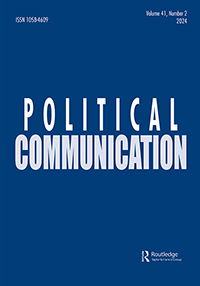Don’t Make My Entertainment Political! Social Media Responses to Narratives of Racial Duty on Competitive Reality Television Series
IF 4.6
1区 社会学
Q1 COMMUNICATION
引用次数: 2
Abstract
ABSTRACT To what extent should scholars view competitive reality television series as a politically relevant medium for transmitting messages about race, racial identity, and politics in the United States? Cultivation theory argues that the depiction of social issues and groups on television influences how individuals perceive the world around them. Drawing on this theory, I argue that the increasingly diverse casts of American competitive reality series are a heretofore underexplored site for studying the transmission of narratives related to race and racial justice to ostensibly unsuspecting American television audiences. In this article, I analyze viewers’ reactions to Black contestants discussing their feelings of racialized social obligations when playing the game – what I refer to as narratives of racial duty. Employing a sentiment analysis as well as an inductive thematic content analysis of tweets reacting to four episodes from the 41st season of Survivor, I found that audience members overwhelmingly reacted negatively to embedding narratives of racial duty into the series. Specifically, they described the season as too political – the worst in the show’s history – and even vowed to stop watching. These findings suggest that broadcasting exemplars who challenge prevailing narratives of racial progress may stoke feelings of racial backlash that could ultimately prompt individuals to tune out of these entertainment programs at best, and stoke racial discord at worst. Thus, I conclude that bringing race to the center of communication research offers scholars in both traditions a new vantage point for studying trends in American racial attitudes.别让我的娱乐政治化!社交媒体对竞争性真人秀节目中种族责任叙事的反应
在多大程度上,学者们应该将竞争性真人秀电视连续剧视为一种与政治相关的媒介,在美国传播有关种族、种族认同和政治的信息?培养理论认为,电视上对社会问题和群体的描述会影响个人对周围世界的感知。根据这一理论,我认为,美国竞争真人秀系列中日益多样化的演员阵容是一个迄今为止尚未被充分探索的领域,可以用来研究与种族和种族正义有关的叙事向表面上毫无防备的美国电视观众传播。在这篇文章中,我分析了观众对黑人选手讨论他们在玩游戏时对种族化的社会义务的感受的反应——我称之为种族责任的叙述。通过对《幸存者》第41季四集的推文反应进行情感分析和归纳主题内容分析,我发现绝大多数观众对在剧中嵌入种族责任叙事的反应是负面的。具体来说,他们形容这一季过于政治化——是本剧历史上最糟糕的一季——甚至发誓要停止观看。这些发现表明,挑战主流种族进步叙事的广播典范可能会引发种族反弹情绪,最终可能促使个人远离这些娱乐节目,最坏的情况是引发种族不和。因此,我的结论是,将种族问题置于传播研究的中心,为两种传统的学者研究美国种族态度的趋势提供了一个新的有利条件。
本文章由计算机程序翻译,如有差异,请以英文原文为准。
求助全文
约1分钟内获得全文
求助全文
来源期刊

Political Communication
Multiple-
CiteScore
13.90
自引率
2.70%
发文量
30
期刊介绍:
Political Communication is a quarterly international journal showcasing state-of-the-art, theory-driven empirical research at the nexus of politics and communication. Its broad scope addresses swiftly evolving dynamics and urgent policy considerations globally. The journal embraces diverse research methodologies and analytical perspectives aimed at advancing comprehension of political communication practices, processes, content, effects, and policy implications. Regular symposium issues delve deeply into key thematic areas.
 求助内容:
求助内容: 应助结果提醒方式:
应助结果提醒方式:


